|
Four things came instantly to mind watching The Reckoning; firstly, the ruthless character of Gordon Gecko in Oliver Stone's Wall Street; secondly, the Monty Python sketch of the returning son to a dysfunctional family inverting the gritty northern parents and the effete Londoner cliché; thirdly there's Get Carter, in some ways a spiritual brother to The Reckoning. Finally, it needs to be mentioned that the sexual politics from the very start of this film are firmly rooted in the era (late 60s) and may appear to a modern audience to be shamefully politically incorrect. The lead character has a trophy wife who is well aware of her romantically compromised status. She deliberately uses her contempt for her husband's Irish background and the chip the size of a bus on his shoulder and a well aimed slap to lead him to retaliatory violence, which then fuels their physical passion. There is a cut in the first scene that could be held up as one of the most divisive I've ever seen.
The actual cut is foreshadowed here in a series of frame grabs;
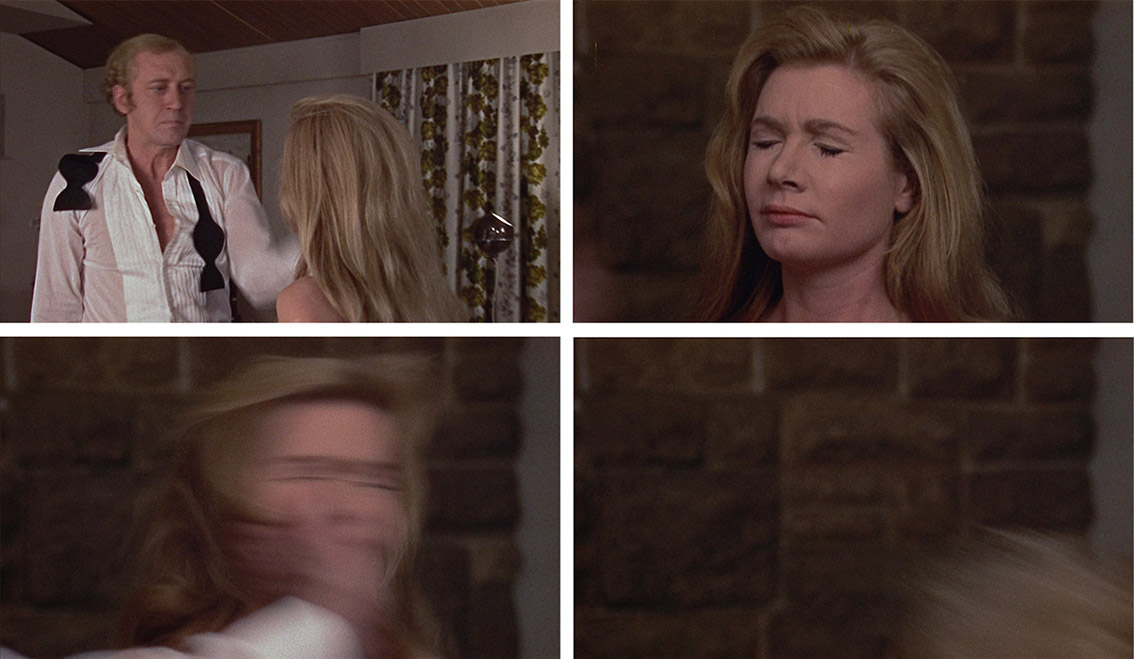
After being called an Irish peasant and slapped, Williamson reacts with a slap of his own. As Ann Bell recoils falling out of frame right...
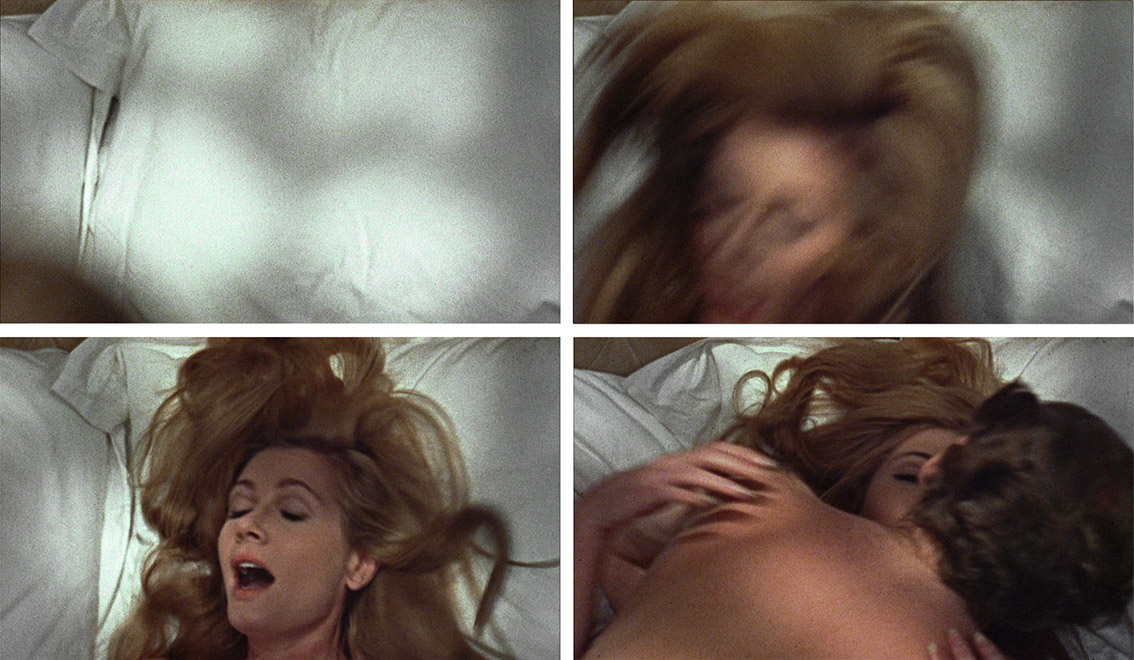
...she re-appears from the right to fall in mid-sexual arousal on to a pillow with a naked Williamson following on top of her seconds later.
Defenders of this associative editing in 1969 may be overwhelming in number vis-a-vis "We all know sex is a penetrative act, an act of almost violence so violence is related, right?" A less regressive 2017 point of view may appreciate the filmmaking craft but not the underlying idea of women enjoying real violence as foreplay. From my own perspective, let me share a personal story on the same subject. A gentle man (space between words intended), an ex-colleague of mine with great sensitivity looked somewhat confused one day in work. "What's up?" I asked. "It's my wife..." he said. "She asked me to treat her roughly before and during sex." It was the first time I'd heard real world confirmation of an aspect of sexuality that must have plugged deeply into the rape fantasy that men seemed to enjoy in earlier decades. God, I wish the 'in earlier decades' were true. There's that ominous phrase in one of Ian Fleming's Bond books, 'the sweet tang of rape,' a concept that I hope would have long since passed as unacceptable. This friend of mine could have no sooner been mildly rough to his wife as he could have cut off his right arm with his right arm. Human sexuality is pretty diverse as we are an imaginative species but there seems to be some attraction in submitting control to another whether that's roughly or otherwise. The dividing line between excitement and potential injury seems to be the level of pain inflicted. And the phrase 'each to his/her own' seems to apply here but mutual understanding would always seem to be a good way forward. We'll put that subject roughly to bed for the moment.
I was too young to appreciate Nicol Williamson's rise to exalted actor but his was always an intriguing and interesting face on the cinema screen. The Reckoning suits Williamson's talent and with the exception of some dodgy social politics and overwrought and dated zooms in and out, director Jack Gold serves his star and story very well and the story is a fascinating one. An ambitious, high-powered businessman, Michael 'Mick' Marler, works in London. He's well up the greasy pole in a business machine company whose future is at risk because of computerisation. His self-aware trophy wife plays the part and reaps the rewards but knows she's only there to lend social respectability to a man whose background at the time was regarded with no little suspicion. Michael is Irish and anti-Irish fervour was at its height in the late sixties and early seventies. Only yesterday, I experienced an echo or shadow of that prejudice. The late '60s was a period of social upheaval and the UK was gripped in an uneasy relationship with Northern Ireland, specifically its weathering of selected acts of terrorism by the IRA. Being Irish at that time was loaded with cultural significance and suspicion. I was shocked to find there is actually a term describing this attitude; Hibernophobia. Marler gets news that his father is gravely ill back in Liverpool and after pitching up there to a front room identical to my own grandmother's in the '60s which was a bit of a shock, his father expires at the precise moment the prodigal son walks into the bedroom (we can forgive the older actor's mouth twitch because, don't tell anyone, he's only pretending to be dead). Presumably not as close to his family as he ought to be, Marler is still moved and upon closer examination, he sees huge bruises on the side of his father's body. After some investigation he finds out the identity of the culprit and sets about taking revenge.
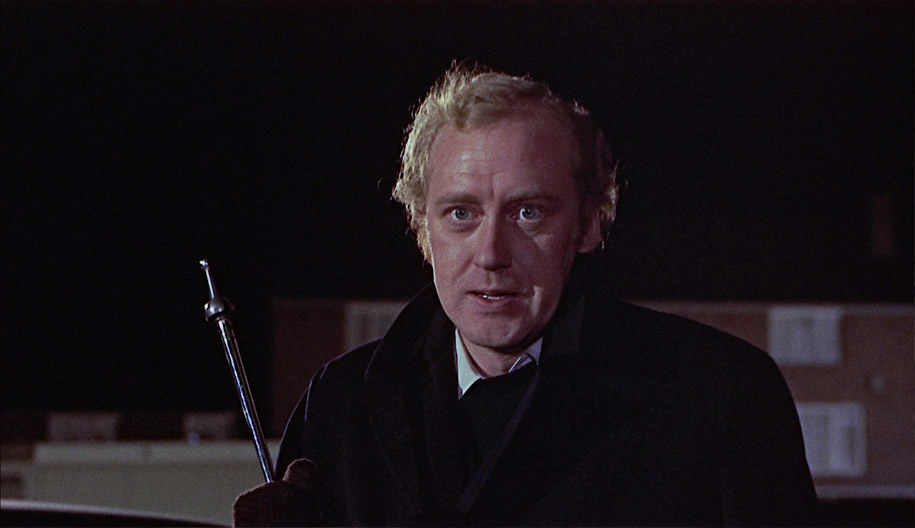
What sets this drama apart is the gritty and not altogether pleasant milieu in which Marler operates. Seedy is close to the vibe I'm after here despite his evident success in terms of house and car owned. This is the British class system in all its rancorous shabbiness. He's a nasty piece of work with few redeeming qualities and Williamson does not shy away one inch from the character's irredeemable traits. He also seems to be catnip to the ladies. His relationship with his trophy wife seems to consist of barely concealed loathing despite the urgent, primal sexual activity. In as many days, Marler beds three women and in our post-AIDS world this seems a tad dangerous; there's no hint of contraception but 'the pill' was a liberating force in the '60s in the UK. I can't say I'm totally convinced by Williamson as a Lothario but as each sexual encounter says something about this odious man and the poor women he's exploiting, the scenes are more than justified dramatically speaking. His co-stars give good support. As the trophy wife, Rosemary, Ann Bell is sexy and smart (and sells 'the violence as exciting part' way too well). Along the way he seduces both Rachel Roberts and Zena Walker, the former I fondly recall from O, Lucky Man and Picnic At Hanging Rock and the latter I will encounter again in the next film I'm covering, A Day in the Death of Joe Egg – coming soon to a web page near you... It's also nice to see Joe Gladwin with that distinctive accent used to such great effect as Wally Batty in the BBC's Last of the Summer Wine. The celebrated Watson to Jeremy Brett's Holmes,Edward Hardwicke gets a short scene, berated mercilessly by Williamson.
Shot by famed cinematographer Geoffrey Unsworth (three of his films are on several 'Best of' lists of mine; 2001: A Space Odyssey, Cabaret and Superman), the movie is lit according to the reality (one assumes) of the actual locations. There is a dour aspect to the photography that keeps the mood sombre throughout. We get lively once in a wrestling/bingo nightclub but that's more to do with the miasma of cigarette smoke than anything else. It's hard to imagine smoke indoors now. I had a meal in a smoking allowed restaurant abroad a while ago and subsequently my clothes reeked of stale tobacco. In fact my stomach is turning over just thinking of it now. The '60s must have stunk to high Heaven... With great performances, a gritty premise and an anti-hero who is unafraid to show a darker side, The Reckoning is a fascinating drama that rewards your time. Just cut the sexual politics a bit of slack. As a famous writer once wrote "The past is a foreign country: they do things differently there."
The Reckoning is presented in its original 1.75:1 aspect ratio. As mentioned, the film is realistically lit which adds to its gritty look of a cinematic version of realism. If you're looking for grain, you'll find it but there's no distraction. If anything, the colour palette is a little muted but again, these are planned aspects and not subject to criticism. This is what director Jack Gold wanted the film to look like. And it aligns itself with the bitter and twisted (do those twins ever play on their own?) character of the anti-hero.
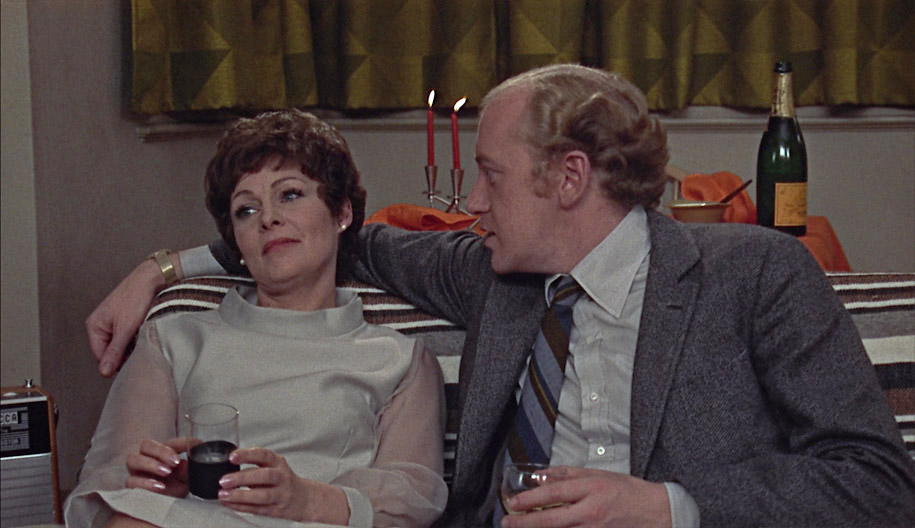
The PCM Mono track is clear with very little background hiss. There's no trouble understanding all the dialogue.
There are optional subtitles for the deaf and hard of hearing.
Culture Clash: Matthew Sweet on The Reckoning (19' 34")
Matthew Sweet, host of Radio 3's criminally short of running time Sound of Cinema (23 minutes an episode) and all round champion of film gives us a terrific context in which to judge The Reckoning. He reminds us that social mobility had a cost and the '60s were the years that gifted young people were going to university for the first time and returning home to find parents who no longer understood the context of their offspring's new lives... Again, I'm reminded of the following from Monty Python:
| Mum: |
He's had a hard day dear... his new play opens at the National Theatre tomorrow. |
| Ken: |
Oh that's good. |
| Dad: |
Good! Good? What do you know about it? What do you know about getting up at five o'clock in t'morning to fly to Paris... back at the Old Vic for drinks at twelve, sweating the day through press interviews, television interviews and getting back here at ten to wrestle with the problem of a homosexual nymphomaniac drug-addict involved in the ritual murder of a well known Scottish footballer. That's a full working day, lad, and don't you forget it! |
| Mum: |
Oh, don't shout at the boy, father. |
| Dad: |
Aye, 'ampstead wasn't good enough for you, was it? ... you had to go poncing off to Barnsley, you and yer coal-mining friends. (spits) |
| Ken: |
Coal-mining is a wonderful thing father, but it's something you'll never understand. Just look at you! |
| Mum: |
Oh Ken! Be careful! You know what he's like after a few novels. |
Sweet takes us through society's changing tides as well as denoting Nicol Williamson's aggression and how necessary it was to his talent. To my ear, this sounds like the casual white-washing of premeditated acts of violence committed by professional football players, acts dismissed offhandedly as a way of vindicating their skill. People who belong in jail have a get out of jail free card if they are paid hundreds of thousands a week to kick a ball about on a field once or twice a week. I'm not suggesting these people are not talented. I'm saying that perhaps it's not necessary for certain players to plant their elbows with some force in other players' ears just to show people what drives them to greatness. Some people are just bastards sometimes, talent or no talent. Sweet also describes Rachel Roberts' deteriorating relationship with Rex Harrison and the political relevance of Marler's singing drunkenly at his own party. This is a fine extra with Sweet as an informed and knowledgeable source of relevant information.
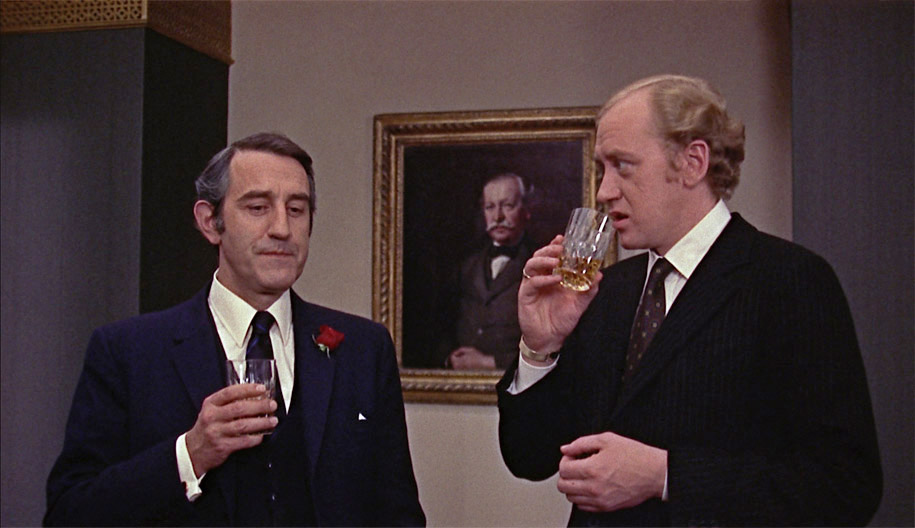
Memories of Marler: Tom Kempinski on The Reckoning (3' 08")
Playing Williamson's drinking buddy Brunzy, actor Kempinski remembers his ten days on the film, a nice little earner. He nods with some respect to Williamson and tells of one behind the scenes moment just before the party was crashed.
On Your Marks: Joe Marks on The Reckoning (3' 56")
Assistant director Marks takes us behind the scenes and reiterates that Williamson could 'blow his top' on occasion. He laments the way that theatre people and film people never seemed to socially or professionally overlap.
It struck me as rather odd that the previous two extras were not more substantial. Who goes to the trouble of finding actors and crew from the film, pitches up at their houses, sets up a camera and microphone and then shoots so little that barely over three minutes and just under four respectively was useful from both sessions? Or were they both interviewed about their careers and had only a short aside to mention The Reckoning?*
Theatrical Trailer (3' 21")
"It's coming... It's here... It's now! From the jungles of the streets to the jungle of success..." Oh this is solid gold! The trailer makes the film out to be a sex and violence heavy, car-crashy exploitation piece in about the most unsubtle way you could imagine. It's fantastic!
Image Gallery
This includes; 8 x colour front-of-house-stills with insets full of relevant information, 3 x black and white behind the scenes (check out the size of that camera!), 1 x black and white publicity still, 1 x French poster and 3 x English/US posters.
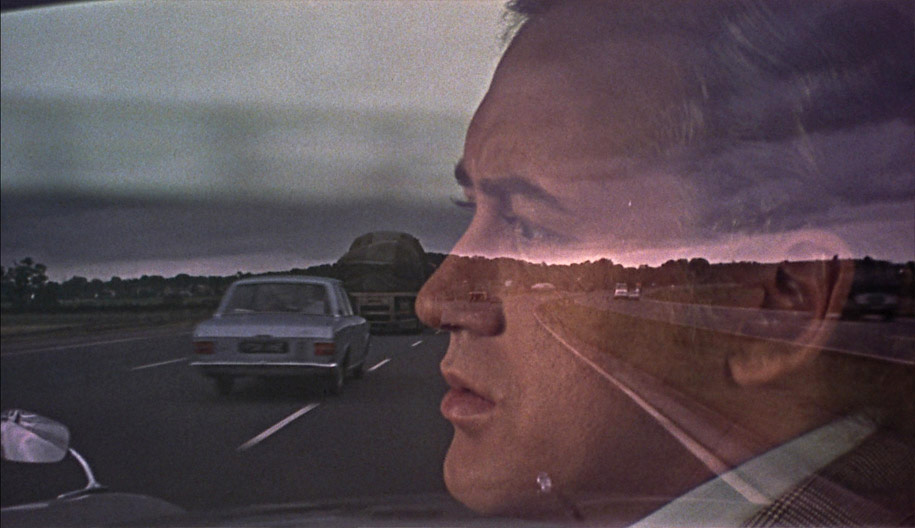
Booklet
Along with the cast and crew credits, we get an essay on the film by film critic Michael Pattison titled Pheasants and Predators, Victims and Peasants. This gives some welcome background information on parts of the film, which may have sailed well over my head. This piece actually deepens your respect for the film and what it was saying. The second article is from 1972, famed theatre critic Kenneth Tynan’s piece entitled Nicol Williamson and John McGrath. Here you'll find lots of juicy nuggets on Williamson’s behaviour and playwright/screenwriter McGarth’s tolerance. Lastly we have Jack Gold on The Reckoning, a selection of quotes about the project taken from the director’s own press cuttings. One is very illuminating and flags one small "Hang on..." that I felt while watching the film. There’s a lot of back projection in the driving scenes. In older movies, this is usually very obvious, less so today. I wasn’t bothered by it but now I know why they didn’t do them for real. Nicol Williamson couldn’t drive! There’s a scene when he does at least drive out of frame in the smaller car he uses for his revenge on the Teddy boy so I guess… Wait I just checked. The cut suggests the grips may have just pushed the car out of frame. There are extracts from reviews at the time including a rather damp one courtesy of the Monthly Film Bulletin (funny how often that periodical reacted negatively to a lot of now well-regarded films). The booklet is a keeper, no question.
The Reckoning is a complex and era-relevant movie with a dynamic central performance from Nicol Williamson and some dodgy sexual politics. It offers no bland Hollywood morality payback (thirty seconds from the end I imagined the just deserts were coming... I'll leave that ambiguous) and presents this odious and ambitious character, with all warts lovingly polished and plinthed. It's a movie that reminds you that life is seldom fair and in the words of Mr. Sondheim, "Thieves get rich and saints get shot and God don't answer prayers a lot..." It's often perversely entertaining and Williamson is never less than superb as the lead. Recommended.
|